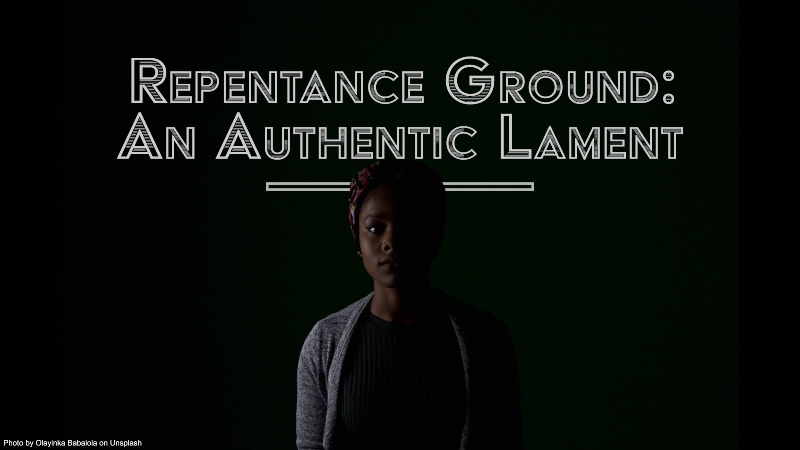Repentance ground: an authentic lament
We need to be intentional about understanding the reality, the history and facts about racial injustice if we are to address it. By Charmaine Mhlanga

Micah 6:8 (Amplified)
He has told you, O man, what is good;
And what does the Lord require of you
Except to be just, and to love [and to diligently practice] kindness (compassion),
And to walk humbly with your God [setting aside any overblown sense of importance or self-righteousness]?
A Shona proverb reads ‘mwana asingachemi anofira mumbereko’. In English this proverb translates: if you do not cry for help or give a voice to your complaints, no one will know or assist and your distress may worsen. The context of the proverb uses the case of the baby that has no other way of communicating other than crying. The voices and cries of oppressed Black children, women and men have been echoing like trumpets throughout the ears of history, yet at times there has been failure to respond immediately to those cries from the Body of Christ, the church. Keeping silent in the face of injustice should bring us to our knees on the repentance ground of an authentic lament.
Stephen Lawrence was murdered in a racially motivated attack while waiting for a bus in Well Hall Road in 1993; George Floyd was subjected to inhumane and merciless brutality resulting in yet another death of a Black man as a result of systemic and institutional racial injustices; Paulette Wilson, a prominent Windrush campaigner, who was wrongly detained and threatened with deportation due to the ‘hostile environment’, this demonstrated yet another Black woman fighting for justice for those affected by the Windrush scandal. Sadly, Paulette died unexpectedly at the age of 64. The cries of Stephen Lawrence, George Floyd, Paulette Wilson and many others continue to echo until true justice is achieved.
Desmond Tutu once stated, “if you are neutral in situations of injustice, you have chosen the side of the oppressor. If an elephant has its foot on the tail of a mouse, and you say that you are neutral, the mouse will not appreciate your neutrality.”
With all the accounts of racism and racial injustice in health, education, employment, housing, public services and immigration, we need to call out sin as sin, and racism including all forms of racial injustice is sin. And amid these injustices we lament, pray and seek God’s direction for practical action.
I often reflect on what God’s Word says about the attitude of my heart, my innermost thoughts and intentions in responding to God’s personal utterances. I am commanded to love my neighbour as myself (Mark 12:31) to seek the good of others over my own self-interest (1 Corinthians 10:24) to genuinely love others, hating what is evil and holding on to what is good (Romans 12:9). These commands are not only relevant to me but all believers in Christ who are called to an authentic walk of sincere obedience to God’s Word, failure or ignorance to obey is disobedience.
God’s Word helps us to recalibrate our priorities, values and self-interest in light of seeking the good of our brothers and sisters who remain oppressed and at the receiving end of racism and racial injustices in our churches and communities. True change starts from within, there is need to confront the difficult and uncomfortable exercise of reviewing the reality of white privilege and inherited white supremacy. True repentance will happen when genuine and honest introspection occurs, that leads to a deep lament and confession of committed sins. This lament is the passionate expression of grief when brokenness is experienced as the result and impact of racial injustice; calling us to cry aloud, weeping and wailing that our Black brothers and sisters are being subjected to dehumanising and inhumane treatment. The actions that will follow from prayer and true repentance will be liberating and transformational.
The repentance ground of authentic lament will enable honest, humble and heartfelt prayers of confession, asking God for forgiveness. Therefore, we need to be intentional about understanding the reality, the history and facts about racial injustice if we are to address it. True repentance is about confession, an agreeing with God that what has been done in perpetrating racial injustice or keeping silent in the face of injustice is wrong. The evil of racism, oppression, slavery, killings and injustice will continue if we remain silent and at present, we have not sufficiently dealt with the past so as to learn from the past.
The stench of the sin of racial injustice should strike at the heart of every believing Christian and we cannot be silent or look away. An African theologian, St Augustine of Hippo wrote: “Hope has two beautiful daughters; their names are Anger and Courage. Anger at the way things are, and Courage to see that they do not remain as they are.”
Christians are living stones and living sermons that need to stand up in anger, enraged by the racial injustices that we see and speak up courageously calling out racial injustices for what they are, sin. An authentic lament before God will require actively, attentively and sensitively listening to the hurts of those who have had to suffer and continue to experience racial injustice. Safe spaces to articulate the impact and hurt will need to be on the foundations of truth and reconciliation.
Black people have been crying out for justice over the centuries, the question is: are you ready to listen?
Pastor Charmaine Mhlanga is a Minister in Training at Sundon Park Baptist Church, Luton, Bedfordshire. She is currently studying a Masters in Christian Thought and Practice at Spurgeon's College
Want to comment on this reflection? Please leave your thoughts via this contact form.
Some comments may be shared below.